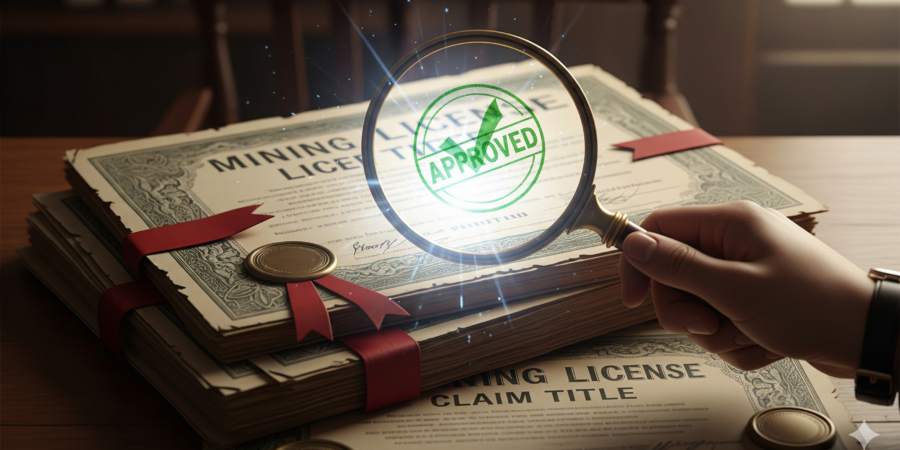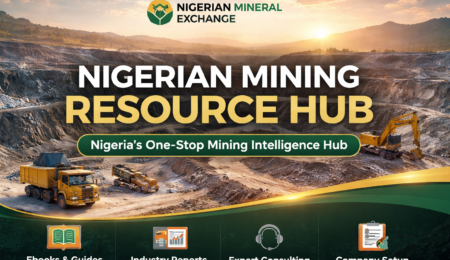Investing in Nigeria’s mining sector offers incredible opportunities – from gold and gemstones to lithium and industrial minerals. However, the single biggest mistake many investors make is jumping into deals without verifying whether the project’s mining license or mineral title is valid, current, and legally transferable.
Nigeria’s mining sector is strictly regulated, and any investor who ignores due diligence on licenses risks losing capital to fraud, disputes, or government revocations. This article provides a step-by-step guide on how to verify mining licenses and titles in Nigeria, ensuring that your investments are built on a strong legal foundation.
Why License Verification is Critical for Investors
- Prevents Fraud – Unscrupulous operators sometimes parade expired, revoked, or forged licenses to attract unsuspecting investors.
- Ensures Legal Security – The Nigerian government has tightened its oversight of mining rights. Any project without a valid license can be shut down at any time.
- Protects Your ROI – Even if the mineral is genuine, if the license is invalid, you cannot legally extract, export, or profit from the resource.
In short: no valid license, no real investment.
The Regulatory Framework: Who Issues Mining Licenses in Nigeria?
All mining titles in Nigeria are administered by the Mining Cadastre Office (MCO), a department under the Ministry of Solid Minerals Development.
The MCO issues and manages the following major titles:
- Reconnaissance Permit – Early-stage exploration.
- Exploration License (EL) – Medium-term rights to explore specific minerals.
- Small-Scale Mining Lease (SSML) – For artisanal and small-scale mining.
- Mining Lease (ML) – Full rights to develop and operate a mine.
- Quarry Lease (QL) – Extraction of construction materials.
Each title has a unique reference number, a set validity period, and is tied to a specific geographical location.
Step-by-Step Guide to Verifying Mining Licenses in Nigeria
1. Request the License Number and Documents
Every genuine license holder should be able to provide:
- A copy of the mining license/title certificate
- The title number (e.g., EL12345)
- The coordinates of the licensed area
🚩 Red flag: If the operator refuses to provide these, walk away immediately.
2. Conduct a Search at the Mining Cadastre Office (MCO)
Investors can formally apply to the MCO for a license verification search. This process checks whether:
- The license is valid and active
- The licensee is the rightful owner
- There are no encumbrances (e.g., overlapping titles, revocations, or pending disputes)
This step is non-negotiable for investors who want legal security.
3. Check License Validity Periods
Each license has an expiry date. For example:
- Exploration License: 3 years (renewable)
- Small-Scale Mining Lease: 5 years (renewable)
- Mining Lease: 25 years (renewable)
Investors should ensure the license is not expired and that renewals have been filed where applicable.
4. Verify Ground Coordinates and Site Visits
A license might be genuine but not located where the promoter claims. Engage a surveyor or geospatial expert to confirm:
- The coordinates match the official records
- The license area is not under dispute or government restriction
- Actual field conditions align with the documents
At Nigerian Mineral Exchange (NME), we often use GIS mapping to overlay license coordinates with official mining blocks for accuracy.
5. Confirm Environmental and Community Approvals
Even with a valid mining license, operations can stall without:
- Environmental Impact Assessment (EIA) approval
- Community consent agreements with host communities
These approvals add another layer of legal and social security for your investment.
6. Hire Local Experts for Due Diligence
License verification requires local knowledge, government connections, and field expertise. International investors, especially, should never attempt it alone. Working with trusted intermediaries ensures that:
- Fake documents are identified early
- Government processes are properly followed
- Investors avoid common traps
Common Red Flags in Mining License Deals
- Multiple claims on the same site
- Expired or revoked titles still being marketed
- Forged certificates with altered stamps
- “Verbal” claims of ownership without documents
- Unrealistically low entry costs for high-value projects
If it sounds too good to be true, it probably is.
How Nigerian Mineral Exchange (NME) Helps Investors
At the Nigerian Mineral Exchange (NME), we specialize in investor protection through due diligence and project vetting. Our consultancy product, the Nigerian Mining Investment Navigator, offers:
- Verified license checks with the MCO
- On-site validation of mining areas
- Legal compliance screening to ensure titles meet regulatory standards
- Comprehensive due diligence reports
We work with a limited number of serious investors each quarter to ensure focus and success.
📌 Book a Strategic Investment Consultation today to avoid fraud and secure vetted opportunities in Nigeria’s mining sector.
Related Resources
- Unlocking Nigeria’s Mineral Wealth: 113 Lucrative Business Ideas (Ebook)
- Mining & Mineral Trading Company Setup (Nigeria)
- The Nigerian Mining Investment Navigator
📘 The Nigeria Mineral Trading & Licensing Blueprint (2026 Edition)
If you are serious about buying, selling, or trading minerals legally in Nigeria, you cannot afford to rely on guesswork, outdated advice, or hearsay. The regulatory environment is tightening fast, and costly mistakes now lead to permit denials, seizures, or permanent blacklisting.
That’s why we created The Nigeria Mineral Trading & Licensing Blueprint: 2026 Guide to Buying Center Licenses & Purchase Permits — an updated, clear, step-by-step, insider guide that shows you exactly how to obtain Mineral Buying Center Certificates, Purchase & Possession Permits, and related approvals without delays or regulatory traps.
This guide distills real regulatory procedures for 2026, compliance requirements, and practical insights used by serious operators — saving you months of confusion, wasted money, and avoidable risk.
If mineral trading is part of your business future, this blueprint is not optional — it’s protection.
Conclusion
Nigeria’s mining sector holds massive opportunities, but without license verification and due diligence, investors are exposed to unnecessary risks. By working with the right experts and following a structured process, you can confidently invest in projects that are legal, profitable, and secure.
🔑 Remember: The strength of your mining investment begins with the strength of its license.
READ ALSO:





Leave a Reply